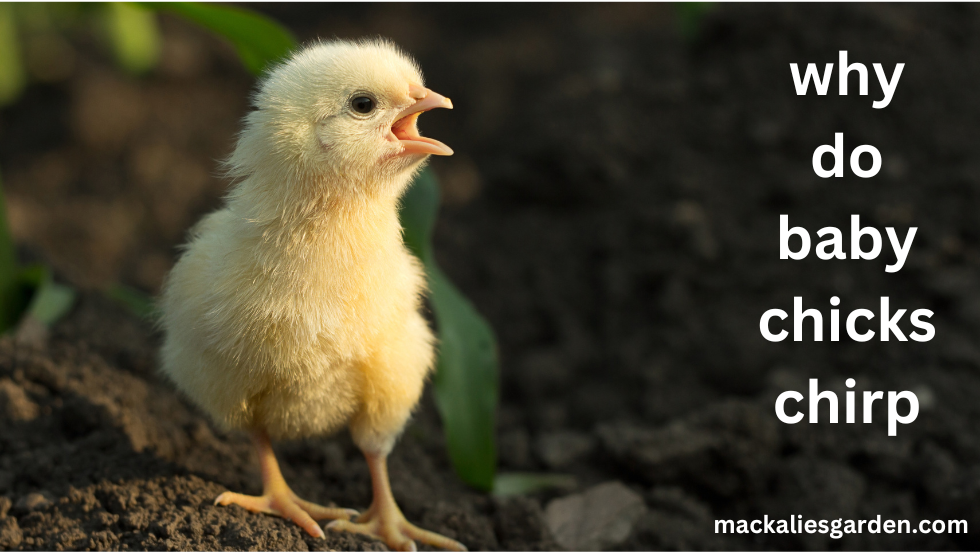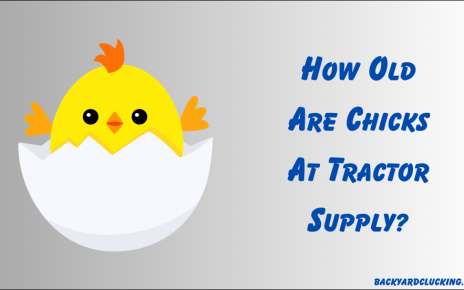Baby chicks are known for their adorable chirping sounds and fluffy appearance. But have you ever wondered why they chirp? What is the purpose of this loud and sometimes incessant noise?
In this document, we will explore the reasons behind baby chicks’ chirping behavior and its significance in their development.
Common Reasons Why Your Lovely Chick Is Chirp
Here are most common reasons why your chicks are chirping;
Not Getting Desire Temperatures
COLD
When there’s a draft coming in, and the cold wind is entering their brooder, your chicks will chirp loudly and run away from where the wind enters. Breezes make chicks very uncomfortable, and they will try to avoid them as much as possible.
WARM
Chicks don’t care if the temperature is too high or too low. Even when the temperature changes, they’re fine.
If a heatwave or the room temperature rises, you may need to move their brooder or lower the temperature.
Thirsty
Chicks learn to drink from a shallow pan or bowl by watching their mother. You can encourage this skill by putting reflective objects in the water.
Ensure the water containers don’t go too deep because chicks can drown. They drink a lot of water when there are a lot of them.
Give chicks water to stay hydrated. If they’re dehydrated, they won’t eat. Check after they’re given water to make sure they’re drinking.
Like Human They Chirp While Hungry
Baby chicks don’t need much food; immediately after hatching, they must eat. Broiler chicks, in particular, need to eat a lot; if they don’t, they’ll make a lot of noise.
Provide your chicks with a mineral- and vitamin-rich starter feed. Avoid distress vocalizations caused by hunger by always providing food.
Don’t give your baby chicks old feed; it can make them sick. Also, ensure the food you give them is free from droppings, dirt, or debris. This can affect their health over time.
When they Feel Scared
When chicks are little, they are delicate and shy. They can be scared when the hen dies, or other chicks tease them. If your chicks are scared, they will make loud noises to call their mum.
From a young age, baby chicks know the danger predators can bring. If they spot a predator in the area, they will make loud noises to alert you of its presence.
The chicks will keep chirping until you help them or the predator leaves. This is a survival tactic for them; if one gets hurt, it will call for help until it is safe.
Your Chicks Want to Communicate
When you hear baby chicks chirping, they can communicate with their mom, thirsty or scared.
Baby chicks communicate with their mothers by chirping, which signals they need food.
They Are Feeling Happy
Chicks chirp when they’re happy and have what they need. This softer chirping is more peaceful and less demanding.
You’ll hear the chicks are happy and not stressed out if you listen. You can congratulate yourself if you listen to them make these happy chirps.
At what age do Baby Chicks cease their Chirping?
Young chicks won’t make noises for the rest of their lives. These creatures will stop making sounds when they’re 3–4 months old. After that, chickens only make noises when mating or fighting with other chickens.
Useful Tips to Make Your Chicks Comfortable
Raising chicks requires careful attention to their comfort and well-being. Here are a few tips to ensure they stay healthy and thrive:
- Maintain the Right Temperature: Young chicks need a warm environment. Use a heat lamp to keep the brooder’s temperature around 95 degrees Fahrenheit in the first week, gradually lowering it by about 5 degrees each week until they have fully feathered out.
- Provide Adequate Space: Chicks need room to move, play, and grow. Ensure your brooder is spacious enough, about 2 square feet per chick.
- Ensure Clean Water and Proper Feed: Always keep fresh, clean water available, and use a chicken feeder to keep their food clean and easily accessible. Feed them a special chick starter feed for the first 8 weeks.
- Establish a Safe Environment: Make the brooder predator-proof and always supervise any pets or small children interacting with the chicks.
- Provide Perches: Even young chicks will start practicing perching. Include low perches in the brooder to help them develop this natural behavior.
By following these tips, you can create a comfortable and nurturing environment for your chicks and watch them flourish into healthy, mature chickens.
Conclusion
Chicks chirp to communicate with their mother if they are stressed due to lack of warmth, water, or nourishment. The chirping serves as a warning alarm to prompt caretakers to check on them and ensure their needs are met.
Baby chicks, particularly of breeds like the Rhode Island Red or Leghorn, are typically yellow and they look a very cute while chirping.
The chicks must be carefully cared for due to their susceptibility to unfavorable conditions. If they become lost, injured, or in danger, they will emit a distress call, alerting the mother hen to locate them.
Related Post- Why Are Baby Chicks Yellow?




